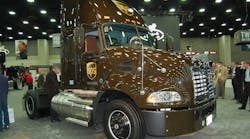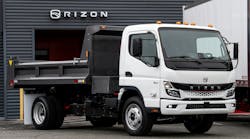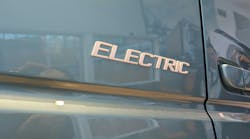BETHLEHEM, PA. Figuring out if natural gas is the right fit for a particular fleet comes down to a number of cost calculations, according to a variety of experts, which include weighing the extra upfront price of natural gas-equipped vehicles against the expected fuel cost savings between natural gas and diesel over the ownership life of a truck.
Curtis Dorwart, refuse product marketing manager for Mack Trucks, for example, told Fleet Ownerhere ahead of a product rollout event that the trash truck segment is seeing a sustained upswing in natural gas-fired model orders due to a complex mix of factors in which the cost differential between natural gas and diesel is only one.
“The biggest initial hurdle is getting the [refueling] infrastructure in place, but that’s been accomplished in many areas through grants and other forms of government support,” he explained. “The refuse industry in particular has benefited from municipal contracts that include provisions requiring natural gas or other alternatively-fueled equipment, which in turn spurred demand.”
The extra maintenance cost for natural gas-powered trucks – including the required use of a different engine oil blend, spark plug maintenance, and changes to maintenance facilities to conform to fire codes – is being offset to a degree by the addition of aftertreatment system maintenance to a diesel-fired truck’s profile, Dorwart said.
Finally, as many refuse fleets operate their equipment anywhere from 10 to 20 years, they get a longer “window” in which to achieve payback from those investments due to the lower cost of natural gas as compared to the price of diesel fuel, he added.
As a result, Mack is reporting that roughly 30% to 40% of its new orders for refuse trucks are now for natural gas-powered models.
Still, for smaller refuse fleets, Dorwart stressed that it’s important to “pencil out” all the upfront costs over the expected lifetime of a truck when compared to the price differential between natural gas and diesel. “That’s the key to making a switch to natural gas really work for the smaller operator,” he said.
But Keith Klein, executive VP & COO for TL carrier Transport America, noted during a panel discussion at FTR’s annual Transportation Conference last week that one of the challenges posed for highway fleets exploring the natural gas option is shorter ownership cycles.
“We look at a five year TCO [total cost of operation] calculation, not on 10 year trends,” he explained. “That’s why we’re taking a ‘wait and see’ approach to natural gas right now. If we were to switch, we’d do so primarily as a ‘green marketing’ effort, because we’re not going to see cheap natural gas forever.”
The future cost of natural gas is what concerned Matthew Callaway, director of maintenance for transportation conglomerate U.S. Xpress Enterprises, at the FTR meeting, as it remains an “untaxed” fuel for right now.
“It’s not taxed or regulated like diesel is yet,” he pointed out. “So what will its price look like in five years?”
Another issue brought up by Brent Nussbaum, CEO of TL carrier Nussbaum Transportation, during the FTR gathering is that the fuel economy profile of today’s highways tractors is improving to the point where it might outweigh the fuel cost advantage natural gas offers.
“The fuel mileage for our 2014 [highway tractor] models is as good as you can get; in fact better than the fuel mileage we could get from natural gas,” he said. “That’s important to consider as we don’t know what the long-term cost [of natural gas fuel] will be.”



